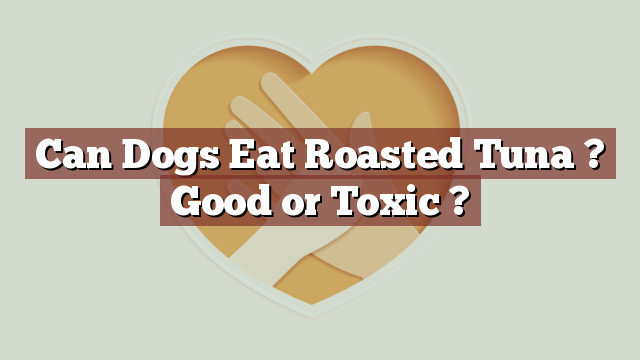Can dogs eat roasted tuna? This is a common question among pet owners who are curious about which human foods are safe for their furry friends. It is essential to know which foods are safe for dogs to consume as it directly impacts their health and well-being. In this article, we will explore whether roasted tuna is a suitable dietary option for dogs, considering its nutritional value, safety, potential risks or benefits, and what to do if your dog consumes roasted tuna.
Nutritional Value of Roasted Tuna
Roasted tuna is a popular seafood dish enjoyed by many humans due to its high protein content and rich flavor. It is a good source of essential nutrients such as omega-3 fatty acids, vitamins D, B12, and selenium. Omega-3 fatty acids are known to support heart health and reduce inflammation. These nutrients make roasted tuna a valuable addition to a well-balanced human diet.
Can Dogs Eat Roasted Tuna? Safety Explained
Can dogs eat roasted tuna? Yes, dogs can consume roasted tuna in moderation. It is important to note that while roasted tuna is generally safe for dogs, it should only be given as an occasional treat and not as a staple food in their diet. Dogs are primarily carnivorous, and their bodies are designed to digest and absorb nutrients from animal-based proteins. The protein content in roasted tuna can be beneficial for dogs, but it should not replace their regular dog food.
However, it is crucial to be cautious when feeding dogs any type of fish, including roasted tuna. Fish bones can pose a choking hazard or cause internal injuries to dogs. Therefore, it is vital to remove all the bones before feeding roasted tuna to your dog. Additionally, the seasoning used in preparing roasted tuna, such as salt or spices, can be harmful to dogs. It is best to offer plain, unseasoned roasted tuna to your furry friend.
Potential Risks or Benefits of Feeding Roasted Tuna to Dogs
Feeding roasted tuna to dogs can have both potential risks and benefits. The high protein content in roasted tuna can be beneficial for muscle development and repair in dogs. Omega-3 fatty acids found in tuna have anti-inflammatory properties and can promote healthy skin and a shiny coat in dogs.
On the other hand, certain risks need to be considered. Mercury is a concern in certain types of fish, including tuna. High levels of mercury can be harmful to dogs, affecting their nervous system. It is advisable to limit the amount of roasted tuna given to dogs to minimize the risk of mercury toxicity. Additionally, roasted tuna should not be a part of a dog’s diet if they have any existing health conditions, such as pancreatitis or kidney disease. Always consult with your veterinarian before introducing any new food into your dog’s diet.
What to Do If Your Dog Eats Roasted Tuna
If your dog accidentally consumes roasted tuna, it is important to remain calm and take appropriate action. If the roasted tuna contained any bones, monitor your dog for signs of choking, discomfort, or difficulty breathing. If you notice any of these symptoms, seek immediate veterinary attention.
If your dog consumed a small amount of roasted tuna without any bones, they will likely be fine. However, keep an eye out for any signs of gastrointestinal upset such as vomiting, diarrhea, or loss of appetite. If these symptoms persist or worsen, consult your veterinarian for further guidance.
Conclusion: Weighing the Pros and Cons of Dogs Consuming Roasted Tuna
In conclusion, dogs can safely eat roasted tuna in moderation. The nutritional value of roasted tuna, including its protein and omega-3 fatty acid content, can provide some health benefits to dogs. However, it is essential to remove all bones and avoid seasoning before offering roasted tuna to dogs. Additionally, the risk of mercury toxicity and individual health conditions should be considered.
As responsible pet owners, it is crucial to be aware of what we feed our dogs. While roasted tuna can be a tasty treat for them, it should never replace their regular dog food. Remember to consult with a veterinarian if you have any concerns or questions regarding your dog’s diet and health. By making informed choices, we can ensure the well-being of our beloved canine companions.
Thank you for investing your time in exploring [page_title] on Can-Eat.org. Our goal is to provide readers like you with thorough and reliable information about various dietary topics. Each article, including [page_title], stems from diligent research and a passion for understanding the nuances of our food choices. We believe that knowledge is a vital step towards making informed and healthy decisions. However, while "[page_title]" sheds light on its specific topic, it's crucial to remember that everyone's body reacts differently to foods and dietary changes. What might be beneficial for one person could have different effects on another. Before you consider integrating suggestions or insights from "[page_title]" into your diet, it's always wise to consult with a nutritionist or healthcare professional. Their specialized knowledge ensures that you're making choices best suited to your individual health needs. As you navigate [page_title], be mindful of potential allergies, intolerances, or unique dietary requirements you may have. No singular article can capture the vast diversity of human health, and individualized guidance is invaluable. The content provided in [page_title] serves as a general guide. It is not, by any means, a substitute for personalized medical or nutritional advice. Your health should always be the top priority, and professional guidance is the best path forward. In your journey towards a balanced and nutritious lifestyle, we hope that [page_title] serves as a helpful stepping stone. Remember, informed decisions lead to healthier outcomes. Thank you for trusting Can-Eat.org. Continue exploring, learning, and prioritizing your health. Cheers to a well-informed and healthier future!

